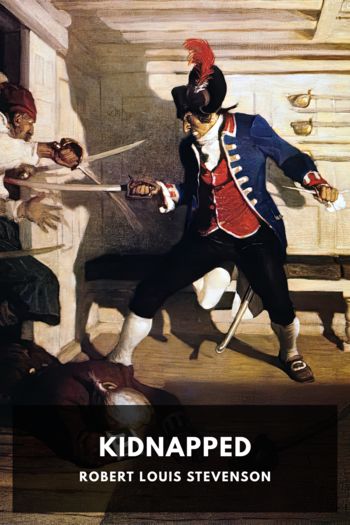Catriona, Robert Louis Stevenson [the gingerbread man read aloud txt] 📗

- Author: Robert Louis Stevenson
Book online «Catriona, Robert Louis Stevenson [the gingerbread man read aloud txt] 📗». Author Robert Louis Stevenson
The same cry, in words not very different, came from both of us, that the other was come in compliment to say farewell, and then we perceived in a flash we were to ship together.
“O, why will not Baby have been telling me!” she cried; and then remembered a letter she had been given, on the condition of not opening it till she was well on board. Within was an enclosure for myself, and ran thus:
“Dear Davie—What do you think of my farewell? and what do you say to your fellow-passenger? Did you kiss, or did you ask? I was about to have signed here, but that would leave the purport of my question doubtful; and in my own case I ken the answer. So fill up here with good advice. Do not be too blate,25 and for God’s sake do not try to be too forward; nothing sets you worse. I am
“Your affectionate friend and governess,
“Barbara Grant.”
I wrote a word of answer and compliment on a leaf out of my pocketbook, put it in with another scratch from Catriona, sealed the whole with my new signet of the Balfour arms, and despatched it by the hand of Prestongrange’s servant that still waited in my boat.
Then we had time to look upon each other more at leisure, which we had not done for a piece of a minute before (upon a common impulse) we shook hands again.
“Catriona!” said I; it seemed that was the first and last word of my eloquence.
“You will be glad to see me again?” says she.
“And I think that is an idle word,” said I. “We are too deep friends to make speech upon such trifles.”
“Is she not the girl of all the world?” she cried again. “I was never knowing such a girl, so honest and so beautiful.”
“And yet she cared no more for Alpin than what she did for a kale-stock,” said I.
“Ah, she will say so indeed!” cries Catriona. “Yet it was for the name and the gentle kind blood that she took me up and was so good to me.”
“Well, I will tell you why it was,” said I. “There are all sorts of people’s faces in this world. There is Barbara’s face, that everyone must look at and admire, and think her a fine, brave, merry girl. And then there is your face, which is quite different, I never knew how different till today. You cannot see yourself, and that is why you do not understand; but it was for the love of your face that she took you up and was so good to you. And everybody in the world would do the same.”
“Everybody?” says she.
“Every living soul!” said I.
“Ah, then, that will be why the soldiers at the castle took me up!” she cried.
“Barbara has been teaching you to catch me,” said I.
“She will have taught me more than that at all events. She will have taught me a great deal about Mr. David—all the ill of him, and a little that was not so ill either now and then,” she said, smiling. “She will have told me all there was of Mr. David, only just that he would sail upon this very same ship. And why is it you go?”
I told her.
“Ah, well,” said she, “we will be some days in company and then (I suppose) goodbye for altogether! I go to meet my father at a place of the name of Helvoetsluys, and from there to France, to be exiles by the side of our chieftain.”
I could say no more than just “O!” the name of James More always drying up my very voice.
She was quick to perceive it, and to guess some portion of my thought.
“There is one thing I must be saying first of all, Mr. David,” said she. “I think two of my kinsfolk have not behaved to you altogether very well. And the one of them two is James More, my father, and the other is the Laird of Prestongrange. Prestongrange will have spoken by himself, or his daughter in the place of him. But for James More, my father, I have this much to say: he lay shackled in a prison; he is a plain honest soldier and a plain Highland gentleman; what they would be after, he never would be guessing; but if he had understood it was to be some prejudice to a young gentleman like yourself, he would have died first. And for the sake of all your friendships, I will be asking you to pardon my father and family for that same mistake.”
“Catriona,” said I, “what that mistake was I do not care to know. I know but the one thing, that you went to Prestongrange and begged my life upon your knees. O, I ken well it was for your father that you went, but when you were there you pleaded for me also. It is a thing I cannot speak of. There are two things I cannot think of





Comments (0)